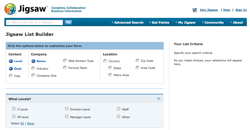Social Media Contact Strategies Heighten Need for Database Hygiene
- Published in Feature Articles
This is part two of a two-part series looking at best practices for managing a contact database. Part one offered key takeaways to optimize response rates by defining lead gen goals and target demographics.
In our last look at database strategies, we examined tactics for developing and expanding a list that matches the needs of your business goals and sales pipeline. In this week’s article, we will look at the importance of refreshing the database and taking steps to make sure the contacts are accurate and targeted.
New resources such as social media and contact data trading sites have heightened the temptation to expand a database with low cost resources. However, industry insiders suggest the focus on data hygiene is just as important the size of the database in successfully driving leads and ultimately opportunities into the pipeline. 
“Building lists by a target audience profile is critical for success and focusing on the highest quality data for a target audience will pay-off down the road,” says Chris Golec, CEO, Demandbase. “Oftentimes, we see companies go for the cheap list of names, without doing the math on the cost of the phone call, mailing, or data maintenance. We are also finding that companies that use multi-channel lists have much higher response, and ultimately a higher marketing ROI.”
While leveraging social media can provide an additional marketing channel for engagement and assessment, industry experts offer the following strategically-focused takeaways to streamline your outbound lead generation:
• Add a ‘born on’ date field to the record. Amy Hawthorne, Director of Marketing at Reachforce, advises marketers to refresh data over a year old and update the born on date. Hawthorne says everyone on the company team will be happy to have this information and it will help at all stages in the demand generation process.
• Customize data: “We are definitely seeing a trend of custom data builds from a portfolio of feeds specific to a defined set of companies or accounts,” says Brian Hession, President, Oceanos. “More and more, companies have a better idea of not only what their prospects look like in terms of demographics, but the actual company names on their prospect list. They’re looking for vendors and sources that can tell them that an actual buyer is on that list.”
• Define quality: Golec says there are two components to qualified databases. 1) relevancy - do I care about this person/are they a potential customer or buyer? 2) accuracy - will the buyer receive my communication? The more segmentation and flexibility offered by the list provider, the more relevant marketers can make their message and the higher the response.
• Be skeptical of titles: “They really don’t tell you what a person does or what their role is in a buying decision,” says Hawthorne. “The end user has different cares and concerns than the financial decision maker does in a buying process. By identifying their roles you can create messages that provide solutions to their pain points.”
• Be selective about data owners: Hession says marketers should be looking for data owners that have an ongoing, educational dialog with their databases, particularly if that conversation relates to your value message. “Sources like publications and community forums can be really rich sources of prospects, because there is already a positive, engaged relationship and a brand association with the data owner that you can leverage.”
Tapping Into Social Media
While most industry insiders agree social media is emerging as an excellent tool to reach targeted prospects and also expand a database, they caution marketers that relevant content is still just as important when driving engagement with new tools. “If you are offering something that is interesting and valuable, it can generate a lot of conversation in the social media realm, which can drive a lot of interest,” says Steve Woods, CTO, Eloqua. “To grow a list, there has to be an offer of value to the audience—we’ve seen eBooks, Webinars, demos, trials and samples all work.” Woods notes an increase in creative content easily shareable via social media vehicles. This contributes both to maintaining an engaged and active list for existing members, but contributes significantly to list building by bringing in new interest and new members to the list.”
Brenda Gelston, President of Marketing Momentum Associates, agrees that social media can serve as an excellent tool for early stage engagement with new prospects. “Social media is emerging as a slow but very effective list building vehicle,” says Gelston. “Social media does not necessarily produce sales ready leads but it is very effective in identifying, profiling and engaging most influential customers, therefore populating the list with more evangelists.”
Gelston suggests BtoB marketers focus on the following three types of data to collect on new prospects:
1. Firmographic data: Name, title, company, position/function, company size, industry;
2. Behavioral data: Trade publications they read, industry associations, trade shows, newsletter sign ups, blogs they read;
3. Engagement data: Key issues and/or problems they are interested in further exploring. (This will help you repurpose your content so that the content you serve them down the line is relevant to their needs.)
View part one of this feature, “Experts Size up Contact Database Growth Strategies to Optimize Response Rates.”

